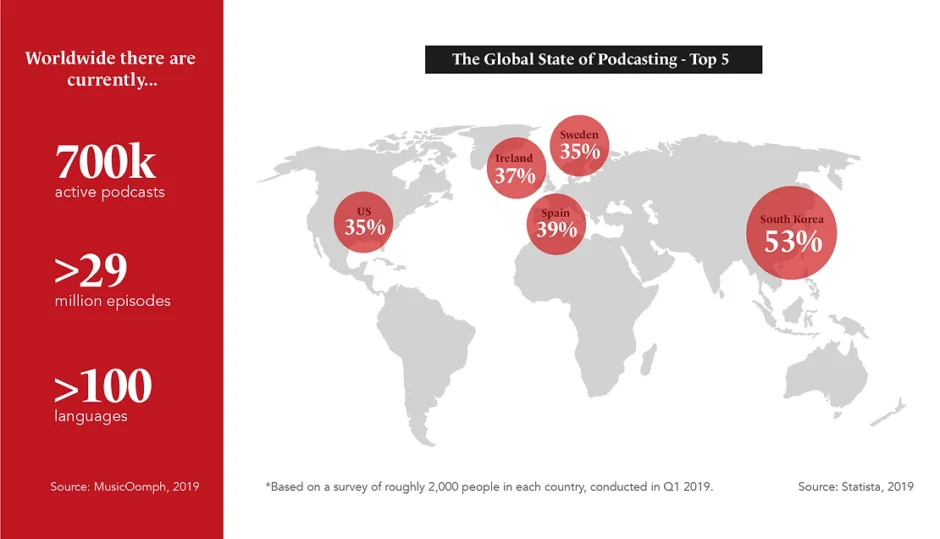As podcasts become a popular medium for learning and knowledge sharing, should the pharmaceutical industry give them a go as a way to educate patients and healthcare professionals?
Words by Louise Rogers
Word of the podcast is spreading: not in whispers, but what can only be described as sonic waves of the highest magnitude. The art of storytelling and listening has been a part of our culture since the beginning; so in a time of sensory overload, when brands broadcast their message to consumers through every possible method, the stripped back nature of podcasts seems to resonate with many, and only increases our insatiable appetite for the medium. How can pharma tune in and press play on the opportunity that podcasts present?
Several individuals were singing podcast’s praises at this year’s Cannes Lions. “It enables a real connection between brand and content and allows them [the brand] to put their stamp on a topic that they want to become the authoritative voice on”, says Russell Goldsmith, Founder, Audere Communications.
The opportunity for healthcare brands here is huge
This concept holds true for most forms of content marketing; however, Goldsmith highlights that the commitment to developing regular podcast content is creating loyalty and trust with an audience who have already chosen to subscribe and download that content. “The opportunity for healthcare brands here is huge: they have the platforms and the distribution to create regular content, and they can use it to inform and educate, while building trust”, he says. This offers a unique opportunity for pharma, who are constantly working towards becoming a more trusted industry.
Opportunity galore
In a world where our senses are increasingly bombarded, we are seduced by the podcast’s one demand: to listen. Podcasts give brands the opportunity to have one-on-one time with their listeners; they allow deeper individual connections to be formed and communities to be built between individuals who relate to a certain topic, for example patients experiencing the same condition and/or going through a similar course of treatment.
The BBC podcast series ‘You, me and the Big C: Putting the can in cancer’ launched in early 2018, and created a tour de force, featuring cancer bloggers telling their stories: the content was difficult to hear but had the aim of normalising conversations around the condition. The podcast’s no-boundaries nature, told in a blackly comedic way, gave it its tagline of ‘the coolest club you never want to be a part of’.
There are more people in the US listening to digital audio than there are people watching video or on social media
“Healthcare is rich with personal stories: hope in the face of despair, courage in the face of uncertainty”, says Zuleika Burnett, Executive Director, Creative and Innovation, Havas Life Medicom. “In the case of a lot of chronic disease, the answer doesn’t lie with taking a load of pills, but rather requires us to change our behaviour. This is where storytelling can help because changing behaviour can be difficult if you do not have a means to do so. It can help bridge the gap between understanding and motivation.”
Patient-aimed content is an area pharma could certainly capitalise on, helping draw on emotive narratives, which are likely to engage, include, and stimulate patients.
Existing examples
The medium has taken flight in certain areas of the industry, with the main objective of getting more content out to more individuals.
Gilead understands that the key to medical education throughout the product lifecycle was scientific engagement and exchange in a way that went further than the traditional one medical professional visiting one doctor. “We have had great success with educational podcasts, interview style, where two doctors discuss specific topics of interest”, says Mike Elliott, VP Medical Affairs, Europe, Middle East & Australasia, Gilead.
So far, Gilead have around 15 10-minute long podcasts to experiment better ways of engaging HCPs. “It’s a great package of what we call ‘nano learning’: a snapshot of one topic rather than having to access a journal online or go to a meeting.”
In 2018, in the UK, nearly 6 million adults tuned in every week to listen to podcasts; in the US this number was 26 million. Representing one of the largest podcast hosting platforms was Spotify’s Chief Content Officer, Dawn Ostroff: “I recently saw a statistic that there are more people in the US listening to digital audio than there are people watching video or on social media.”
She expresses her love for audio, telling the audience how, in 2018, she left her successful lifelong career in television and film because she believed that audio “is the next big thing, if it isn’t already”.
Podcasts are smashing the limitations that are associated with staring at screens. The voice in its raw form is slicing through the noise of other mediums to deliver an uncomplicated message. The message being sent is clearly audible: pharma must integrate podcasts into their strategy and establish a strong position on this platform of new-found ‘earfluence’.










